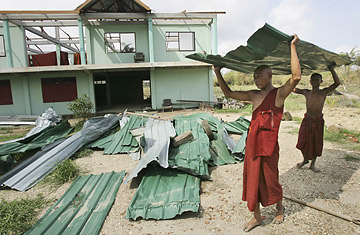
Burmese monks remove a roof damaged by Cyclone Nargis on the outskirt of Rangoon, Burma.
Rangoon travel agent Chin Chin used to take tourists to a nearby Irrawaddy Delta town famous for its pottery. But the vast waterworld of rivers and rice fields that stretched beyond it was a foreign land to her until Cyclone Nargis and its horrific aftermath. On Thursday, Chin Chin and her friends bought rice and water, loaded it on a truck, and drove deep into the delta. She was shocked by what she saw: roads lined with hundreds of cold and hungry villagers, disregarded by their own government, who had walked for an hour from their broken villages to beg from passing motorists.
"They were mostly housewives," recalls Chin Chin, who goes by the nickname. "They told me, 'Rice is a must, so it's worth standing in the rain for three or four hours to get some.' They didn't even have a change of clothes." Fighting back her tears, Chin Chin gave out rice and listened to stories of families torn apart and villages destroyed. "It was piteous," she says. "I really sympathized with them. We didn't see any aid from government or foreign groups."
Chin Chin belongs to a burgeoning homegrown relief effort which is capturing Burmese from all walks of life. Students and shopkeepers, medics and models — thousands of people have now donated money, food or services to Nargis victims. Hundreds like Chin Chin are delivering aid themselves, while privately run local charities are reorienting their operations around cyclone relief.
While they continue to make it difficult for foreigners to offer aid, Burma's generals welcome the help of their own people — at least officially. "Myanmar people's generosity is amazing," marvels a recent article in The New Light of Myanmar, a state-run newspaper.* Privately, however, they must be getting nervous. Ordinary Burmese are horrified by the suffering of their compatriots and angry at the junta's inadequate attempts to alleviate it. Their humanitarian efforts could well spark a political one, especially as it also involves Buddhist monks, who last September led the biggest anti-government protests Burma had seen for nearly 20 years.
Private donors have faced some government restrictions. Those who arrive in the towns have been asked to hand over their relief supplies to local authorities for distribution. Instead, many are reportedly storing the goods with sympathetic locals and secretly distributing them by themselves. The junta doesn't want foreigners distributing aid in the delta, but neither does it feel comfortable with Burmese distributing it. "The government is scared that relief workers will get involved in politics," says a co-founder of one Burmese relief group.
Some are involved already. Celebrated actor Kyaw Thu, who was jailed for a month for joining last September's demonstrations, runs the Free Funeral Services Society, a private charity offering free cremations for the poor. It is now operating its own relief effort, with volunteers at its Rangoon headquarters loading up delta-bound trucks with donated goods.
Another anti-junta stalwart is comedian Zaganar (the name means "Tweezers"), also briefly jailed for his role in last year's protests. Zaganar and his celebrity friends have bought food and medical supplies for Nargis victims and are using their names to raise more funds. Both the disaster and the grassroots response to it are unprecedented in Burma. "I think there will be political consequences," he says. "People are very angry with the government."
The monks are also on the move again. Buddhist temples and monasteries have always played a central role in helping the needy in Burma (as, in this religiously and ethnically diverse country, have churches, mosques and Hindu temples). After the cyclone, monks led small-scale relief efforts into the delta, the distinctive multicolored flags of their faith fluttering from cars and small trucks. Monks from well-known monasteries in Mandalay and elsewhere in Burma are either in the delta or heading there, while in Pakkoku — the Irrawaddy town near Mandalay where last year's protests originated — their brethren are reportedly soliciting donations for cyclone victims. Shwe Pyi Hein Monastery, which already runs a free clinic in Rangoon, has dispatched five volunteer doctors to the disaster area, who are treating more than 100 people every day.
Despite the participation of thousands of Burmese, the impact of this homegrown relief effort will always limited, admits Zaganar. "We deliver our supplies by road because we cannot afford a boat," he says. "But most victims live close to the water. We cannot get through to them." He says Burma desperately needs more boats and helicopters from abroad. Not even the nation's richest private donors — who include junta cronies like tycoon Tay Za, who was put on a U.S. sanctions list last year — have the means or expertise to meet even a fraction of the needs in far-flung delta areas.
*The junta that rules the country unilaterally decreed changes in place names, including Myanmar for Burma and Yangon for the former capital Rangoon. The U.S. State Department has not recognized these changes. TIME has chosen to retain the name Burma.
